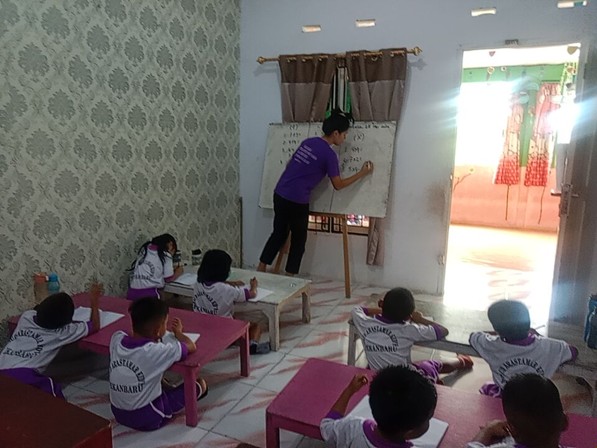Pendekatan Metode Bermain dalam Meningkatkan Kecerdasan Kognitif Anak Usia Dini di PAUD Arastamar Kids
DOI:
https://doi.org/10.47457/jps.v6i1.529Keywords:
cognitive intelligence, early childhood, education, PAUD, play methodsAbstract
This research aims to improve the cognitive intelligence of early childhood at Arastamar Kids PAUD using a play method approach. Considering that children tend to spend much time playing from an early age and their cognitive abilities are still weak, it is important to apply the right approach to educating them. Early childhood education plays an important role in children’s mental, emotional and social development, especially in the 0-8-year phase. The play method was chosen as the main strategy in learning because it is considered capable of providing a fun and effective experience for children’s intellectual development. This service program is carried out at PAUD Arastamar Kids in Pekanbaru by involving teachers and students in a series of play activities designed to stimulate children’s critical thinking and problem-solving skills. This activity is held every Monday to Saturday from 08.00 to 11.00 WIB, with play sessions held before and after formal learning. The evaluation results show a significant increase in students’ cognitive intelligence, demonstrated through increased academic grades and ability to complete creative tasks. The play method approach has proven to be effective in creating a fun and interactive learning environment, as well as contributing positively to children’s cognitive development.
Downloads
References
Admin, Admin. 2024. “Pendidikan Menurut Undang-Undang: Memahami UU No. 20 Tahun 2003 Dan Implikasinya.” dpmptspbrebes. https://dpmptspbrebes.id/2024/12/pendidikan-menurut-undang-undang-memahami-uu-no-20-tahun-2003-dan-implikasinya/ (January 23, 2025).
Anhusadar, Laode. 2016. “Kreativitas Pendidikan Di Lembaga PAUD.” Al-Ta’dib 9(1): 76–93.
Cochran, Moncrieff, and Rebecca S. New, eds. 2007. Early Childhood Education: An International Encyclopedia [4 Volumes]. New York: Bloomsbury Publishing.
Drieling, Claudia. 2011. Constructs of “Home” in Gloria Naylor’s Quartet. 26th ed. Wurzburg: Königshausen & Neumann.
Evitasari, Atika Dwi. 2024. “Karakteristik Dan Problematika Siswa Sekolah Dasar.” Jurnal Ilmiah Pendidikan (JPI) 10(2): 69–75. https://jurnal.uns.ac.id/jpi/article/view/87052.
Fadlillah, Muhammad et al. 2016. Edutainment Pendidikan Anak Usia Dini: Menciptakan Pembelajaran Menarik, Kreatif Dan Menyenangkan. 2nd ed. Jakarta: Prenadamedia Group.
Fitriana, Dina. 2022. “Meningkatkan Perkembangan Kognitif Anak Usia Dini Melalui Alat Permainan Edukatif (APE).” JCE (Journal of Childhood Education) 5(2): 580–89. https://journalfai.unisla.ac.id/index.php/jce/article/view/726.
Halawa, Carinamis, Peni Nurdiana Hestiningrum, and Iswahyudi Iswahyudi. 2021. “Peran Guru Pendidikan Agama Kristen Dalam Pembentukan Karakter Peserta Didik Di Sekolah.” Didache: Jurnal Teologi dan Pendidikan Kristiani 2(2): 133–45. https://jurnal.moriah.ac.id/index.php/didache/article/view/44.
Inanna, Inanna. 2018. “Peran Pendidikan Dalam Membangun Karakter Bangsa Yang Bermoral.” JEKPEND: Jurnal Ekonomi dan Pendidikan 1(1): 27–33.
Karim, Muhammad Busyro, and Siti Herlinah Wifroh. 2014. “Meningkatkan Perkembangan Kognitif Pada Anak Usia Dini Melalui Alat Permainan Edukatif.” Jurnal PG-PAUD Trunojoyo 1(2): 106.
Kilburn, Verna, and Kären Mills. 2018. “Play for Children with Special Educational Needs.” In Perspectives on Play: Learning for Life, eds. Avril Brock, Pam Jarvis, and Yinka Olusoga. London: Routledge, 250–71.
Nasution, Fauziah, Klara Putri Ningsih, Tania May Sabrina Nasution, and Desy Kartika Dewi. 2024. “Psikologi Perkembangan Anak Usia Dini.” Jurnal Bintang Pendidikan Indonesia (JUBPI) 2(1): 117–26. https://ejurnal.stie-trianandra.ac.id/index.php/JUBPI/article/view/2490.
Nurhayati, Siti, and Khamim Zarkasih Putro. 2021. “Bermain Dan Permainan Anak Usia Dini.” GENERASI EMAS: Jurnal Pendidikan Islam Anak Usia Dini 4(1): 1–13. https://journal.uir.ac.id/index.php/generasiemas/article/view/6985.
Soraya, Siti Zazak. 2021. “Pendidikan Karakter Untuk Membangun Peradaban Bangsa.” Southeast Asian Journal of Islamic Education Management 12(1): 74–81.
Sulaiman, Umar, Nur Ardianti, and Selviana Selviana. 2019. “Tingkat Pencapaian Pada Aspek Perkembangan Anak Usia Dini 5-6 Tahun Berdasarkan Strandar Nasional Pendidikan Anak Usia Dini.” NANAEKE: Indonesian Journal of Early Childhood Education 2(1): 52.
Sunarti, Sri. 2021. “Metode Mengajar Kreatif Dalam Menciptakan Pembelajaran Yang Menyenangkan.” Jurnal Perspektif 13(2): 129–37.
Trehearne, Miriam P. 2011. Learning to Write and Loving It! Preschool Kindergarten. Corwin Press.
Wulansari, Mesina, and A Wathon. 2020. “Implementasi Kegiatan 3 M (Mewarnai, Menggunting, Menempel) Untuk Meningkatkan Motorik Halus Anak Usia Dini.” OJS 3(2): 195–217.
Zajda, Joseph. 2020. Globalisation, Ideology and Education Reforms: Emerging Paradigms. ed. Joseph Zajda. Melbourne: Springer Nature.
Zigler, Edward F., and Sandra J. Bishop-Josef. 2006. “The Cognitive Child Versus the Whole Child: Lessons From 40 Years of Head Start.” In Play= Learning: How Play Motivates and Enhances Children’s Cognitive and Social-Emotional Growth, eds. Dorothy G. Singer, Roberta Michnick Golinkoff, and Kathy Hirsh-Pasek. Oxford: Oxford University Press.

Downloads
Published
How to Cite
Issue
Section
License
Copyright (c) 2025 Mei Mesrawati Zega, Sandra Rosiana Tapilaha

This work is licensed under a Creative Commons Attribution-ShareAlike 4.0 International License.
Authors who publish with this journal agree to the following terms:
- Authors retain copyright and grant the journal right of first publication with the work simultaneously licensed under a Creative Commons Attribution License that allows others to share the work with an acknowledgement of the work's authorship and initial publication in this journal.
- Authors are able to enter into separate, additional contractual arrangements for the non-exclusive distribution of the journal's published version of the work (e.g., post it to an institutional repository or publish it in a book), with an acknowledgement of its initial publication in this journal.
- Authors are permitted and encouraged to post their work online (e.g., in institutional repositories or on their website) prior to and during the submission process, as it can lead to productive exchanges, as well as earlier and greater citation of published work (See The Effect of Open Access).











